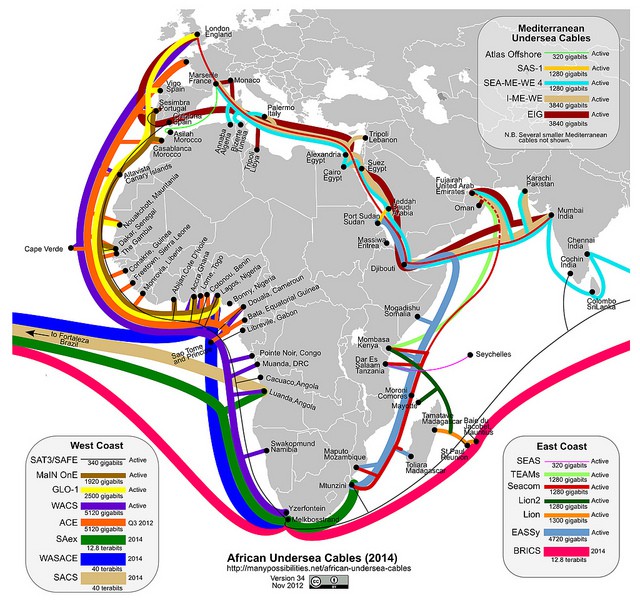
Africa’s international Internet connectivity is primarily provided by underseas fiber cables. (Map: Steve Song)
One of the most common arguments pro-capping telecom companies use is since the rest of the world has already adopted consumption billing for broadband, why can’t North American ISPs follow in their footsteps. But ISPs around the world are actually heading away from capped, throttled, or nickle-and-dime broadband pricing towards flat rate, unlimited service.
The Republic of South Africa is a case in point. Located on the southeastern tip of the African continent, South Africa has faced down a number of broadband challenges. Antiquated infrastructure lacking investment in upgrades, political and economic challenges, and very costly, limited capacity international connectivity have all conspired to leave the country with poor broadband service.
The biggest problem domestically is deteriorating landline infrastructure, leaving most South Africans with slow speed ADSL service. Wireless mobile broadband has proved less costly to deploy, but connectivity costs remain high regardless of how customers obtain service because of international bottlenecks.
South Africa’s problems are similar to those faced in South Pacific nations like Australia and New Zealand. Data caps have been a fact of life for years, primarily because there has never been sufficient capacity on underseas fiber and satellite links to sustain anticipated traffic if the caps were removed. But those problems are starting to ease as new high capacity backbone connections continue to come online.
Heavily capped broadband transforms how people use the Internet. In all three nations, many people do their heaviest web surfing at work over business connections. Some ISPs ease their usage caps or speed throttles during low-demand overnight hours, leaving many to hold off on significant file transfers and software updates until most people have gone to bed.
Regardless of whether you live in Johannesburg, Adelaide, or Wellington, people hate data caps and speed throttles and cannot wait to be rid of them.
That day has come in South Africa. Telkom, the former state-owned telephone company, has announced dramatic price cuts and relaxation of speed throttles for customers choosing its unlimited ADSL offerings. The company has announced a 40% price cut for residential customers and a 35% cut for business customers that took effect Feb. 1. Speed throttles that used to block international traffic when customers were deemed to be “using too much” are also being removed, although Telkom can still reduce speeds for their heaviest users.
Speeds are still very slow compared to what most North Americans can receive, but the average South African can now purchase unlimited 4Mbps ADSL for around $42 a month. A 10Mbps account remains out of reach for many at an unaffordable $157 a month. Some of Telkom’s competitors sell unthrottled and unlimited 1Mbps service for a budget-priced $22 a month.
South African ISPs are managing to achieve speed increases, but the primary bottleneck remains Telkom’s aging copper wire infrastructure. The answer is more fiber links further out in telephone exchanges and reducing the amount of copper customers have between their homes and Telkom’s central exchange offices. Although urban residents in relatively prosperous areas can achieve faster speeds, South Africa’s large expanse of low income areas often rely on prepaid wireless services because wired infrastructure is often sub-standard.
International capacity concerns will continue to ease as new underseas fiber cables are brought online. By 2014, one new underseas fiber cable will be able to carry more Internet traffic than all of the currently operational cables preceding it combined.


 Subscribe
Subscribe